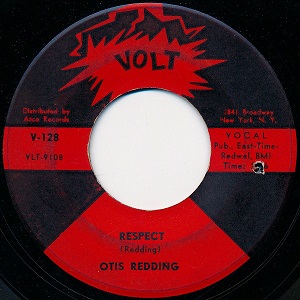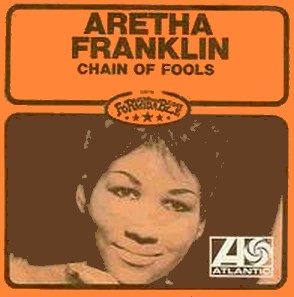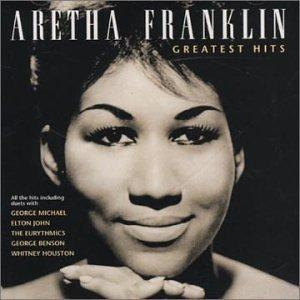Other
- "The House That Jack Built", a 1966 episode of The Avengers
The House That Jack Built may refer to:
JohnHenry most commonly refers to:

Aretha Louise Franklin was an American singer, songwriter and pianist. Referred to as the "Queen of Soul", Rolling Stone twice named her as the greatest singer of all time.

I Never Loved a Man the Way I Love You is the tenth studio album by American singer Aretha Franklin, released on March 10, 1967 by Atlantic Records. It was Franklin's first release under her contract with the label, following her departure from Columbia Records after nine unsuccessful jazz standard albums, and marked a commercial breakthrough for her, becoming her first top 10 album in the United States, reaching number 2 on the Billboard 200. Two singles were released to promote the album: "Respect" and "I Never Loved a Man ". The former topped the Billboard Hot 100, while latter reached the top 10.

"Jumpin' Jack Flash" is a song by the English rock band the Rolling Stones, released as a non-album single in 1968. Called "supernatural Delta blues by way of Swinging London" by Rolling Stone magazine, the song was perceived by some as the band's return to their blues roots after the baroque pop and psychedelia heard on their preceding albums Aftermath (1966), Between the Buttons (1967) and especially Their Satanic Majesties Request (1967). One of the group's most popular and recognisable songs, it has been featured in films and covered by numerous performers, notably Thelma Houston, Aretha Franklin, Tina Turner, Peter Frampton, Johnny Winter, Leon Russell and Alex Chilton. To date, it is the band's most-performed song; they have played it over 1,100 times in concert.
In the Beginning may refer to:

Alan Price is an English musician who first found prominence as the original keyboardist of the English rock band the Animals. He left the band in 1965 to form the Alan Price Set; his hit singles with and without the group include "Simon Smith and the Amazing Dancing Bear", "The House That Jack Built", "Rosetta" and "Jarrow Song". Price is also known for work in film and television, taking occasional acting roles and composing the soundtrack of Lindsay Anderson's film O Lucky Man! (1973). He was inducted into the Rock and Roll Hall of Fame in 1994 as a member of the Animals.
Kingpin or king pin may refer to:

"Respect" is a song written and originally recorded by American soul singer Otis Redding. It was released in 1965 as a single from his third album Otis Blue/Otis Redding Sings Soul and became a crossover hit for Redding.

"I Say a Little Prayer" is a song written by Burt Bacharach and Hal David for Dionne Warwick, originally peaking at number four on the U.S. Billboard Hot 100 pop singles chart in December 1967. On the R&B Singles chart it peaked at number eight.

"This Is the House That Jack Built" is a popular English nursery rhyme and cumulative tale. It has a Roud Folk Song Index number of 20854. It is Aarne–Thompson–Uther Index type 2035.
Respect is a positive feeling or action shown towards someone or something considered important.
"I Never Loved a Man (The Way I Love You)" is a 1967 single released by American soul singer Aretha Franklin. Released on Atlantic Records as the first big hit of her career and the lead single from her tenth studio album of the same name, it became a defining song for Franklin, peaking at number one on the rhythm and blues charts and number nine on the pop charts. The B-side was "Do Right Woman, Do Right Man". Before this Franklin had placed only two Top 40 singles on the pop chart during her modest tenure with Columbia Records.
Nightlife is a human social activity.

"Chain of Fools" is a song written by Don Covay. Aretha Franklin first released the song as a single in 1967 and subsequently it appeared on many of her albums. It hit number one on the Billboard Hot Rhythm & Blues chart and number two on Billboard's Hot 100 chart. In the lyrics, the singer has been with her boyfriend for five years but realizes she's one of his "chain of fools," women with whom he's been cheating. Others tell her to leave him, but she says his love is too strong and she's too weak. Yet someday, she predicts the chain will break.

Greatest Hits is a 1998 Aretha Franklin compilation. It, along with 2001's Aretha's Best, are the only greatest hits compilations that cover both her hits on Atlantic Records (1967–1979) and Arista Records (1980–1998).

Aretha is the thirty-first studio album by American singer Aretha Franklin, originally released on October 27, 1986, by Arista Records. It is the third album with the Aretha title to be released by Franklin, following her 1961 album and 1980 album.
Just for You may refer to:

"The House That Jack Built" is a song written by Bobby Lance and Fran Robbins. It was originally recorded by Thelma Jones and released on the Barry label earlier in 1968. That version did not make the U.S. charts.

30 Greatest Hits is a 1985 Aretha Franklin compilation album. The album chronicles majority of Franklin's hit singles during the Atlantic Records era from 1967 up to 1974. Following Franklin's death, the album entered the top ten of the Billboard 200 albums chart at number seven, in the week ending on August 25, 2018 earning 52,000 units with 18,000 of that were traditional sales. It climbed one spot higher the following week, becoming Franklin's highest-peaking compilation album in the United States.

Rewind: The Aretha Franklin Songbook is the sixth studio and first tribute album by ARIA Award winning, Torres Strait Islander singer Christine Anu. The album and tour were announced in April 2012 and released on 3 August 2012, to coincide with Aretha Franklin's 70th Birthday.